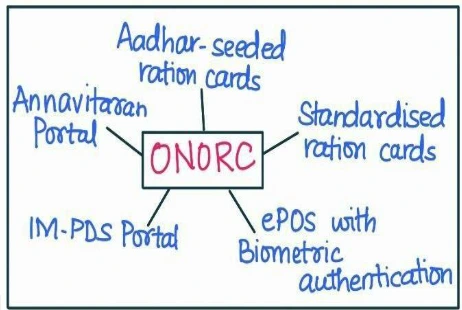Answer:
|
How to approach this question?
- Introduction
- Write about the PDS and ONOR.
- Body
- Explain the menace of ghost beneficiaries in PDS.
- Describe the significance of ONOR in curbing this menace.
- Briefly explain the drawbacks of ONOR.
- Suggest some solutions in the way forward.
- Conclusion
- Conclude on the basis of above points.
|
Introduction:
“One Nation, One Ration Card (ONOR)” is a 2019 initiative that extends the Public Distribution System (PDS) in India. It allows eligible beneficiaries to access subsidized food grains across state borders, ensuring portable access to PDS supplies. It ensures the right for food to internal migrants, whose numbers stand at 45.36 crore.
Body:
PDS And The Menace Of Ghost Beneficiary:

- Fake Beneficiaries and Ineffective Welfare Programs: For instance, 40% of PDS beneficiaries in Uttar Pradesh were found to be fake undermining the program’s purpose.
- Resource Diversion: According to a report by the Ministry of Consumer Affairs, Food, and Public Distribution, around 34% of food grains meant for PDS beneficiaries were being diverted for other purposes.
- Financial Burden: Food subsidy touched Rs 2.87 lakh crore in 2022-23. Misallocation of these finances, costs the government in crores annually.
- Weak Monitoring and Verification Mechanisms: for instance, a study by the Centre for Development Economics and Sustainability in West Bengal, revealed weak verification mechanisms, enabling ghost beneficiaries to exploit the system.
Impact of “One Nation, One Ration Card” on Curbing Menace:
- Cancellation Of Duplicate Ration Cards: ONOR has led to the cancellation of approx. 2.04 crore duplicate ration cards, eliminating ghost beneficiaries and preventing the diversion of subsidized resources.
- Targeting Efficiency: With 85% verified and authenticated beneficiaries across states, the system ensures genuine individuals receive benefits, minimizing the inclusion of fake or ineligible beneficiaries.
- Seamless Access: ONOR enables seamless access to subsidized food supplies across state borders, ensuring consistent availability for beneficiaries regardless of location, and reducing manipulation.
- Transparency and Accountability: Real-time tracking and Aadhaar authentication ensure transparent ration distribution with 81 crore ePoS transactions, ensuring accountability and preventing fraud, benefiting the intended recipients.
Drawbacks of the “One Nation, One Ration Card” System
- Technological challenges, such as infrastructure and connectivity issues, hinder seamless digital system implementation. Approximately 70% of the population has poor or no connectivity to digital technologies while more than 60% of Indian households remains digitally illiterate.
- Administrative and Implementation Challenges: Coordinating between different states, Union Territories, and their respective Public Distribution System (PDS) databases can be complex and time-consuming
- Logistical Challenges: Maintaining an adequate supply of food grains and other essentials across states to meet the demand of mobile beneficiaries can be challenging, particularly during emergencies or natural disasters.
- Resistance from States: Some states may have reservations about participating in the ONORC system due to concerns about losing control over their PDS operations and resources. Example- West Bengal.
- Fiscal Implications: Implementing and maintaining the ONORC system may require significant financial investments. Our food subsidy bill has already touched Rs 2.80 lak crore.
Way Forward:
- Strengthen technological infrastructure for seamless implementation. Establish a robust technological infrastructure to support the ONORC scheme, especially in remote areas where internet connectivity might be an issue.
- Promote inter-state cooperation. Encourage states to coordinate and share relevant information to ensure efficient and seamless functioning of the ONORC scheme.
- Address Aadhaar challenges for efficient authentication.
- Improve data synchronization to minimize discrepancies. Ensure that all states and Union Territories integrate their Public Distribution System (PDS) databases to create a unified and interoperable system.
- Minimize exclusion errors through regular reviews and audits. Conduct extensive awareness campaigns to educate beneficiaries about the benefits and functionality of the ONORC scheme. Engage with civil society organizations, NGOs and private sector as well.
Conclusion:
With these measures in place, the “One Nation, One Ration Card” initiative has the potential to revolutionize the PDS, ensuring that the benefits reach the intended recipients, uplifting their lives, and fostering social welfare across the nation.
To get PDF version, Please click on "Print PDF" button.


Latest Comments